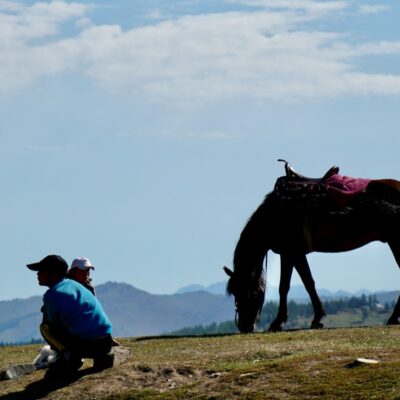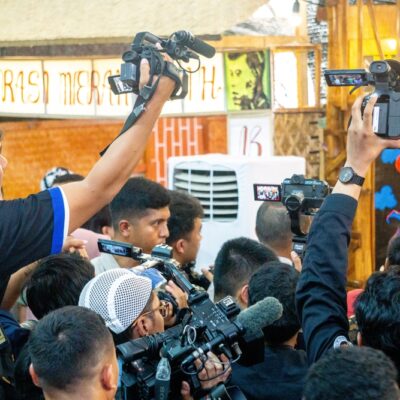“Taiwan is on the front line” Taiwan’s Foreign Minister Dr. Lin Chia-lung says ahead of a recent referendum “and we have to come up with solutions”.
Taiwan is ranked highly as a liberal democracy, but is the target of significant pro-China misinformation and disinformation campaigns (from mainland China and within Taiwan) aimed at undermining trust in elections and democracy, according to several reports and academic research.
Its solutions involve a whole-of-society approach, including legal change, civil society and education.
Legal change
Taiwan’s Fraud Crime Hazard Prevention Act 2024 imposes significant fines on social media platforms which do not remove content that is verifiably fake and intended to be misleading, such as fake videos of celebrities promoting a product that they don’t actually endorse. Taiwan’s Cyber Ambassador, Audrey Tang—who until last year was its first Minister of Digital Affairs—says since the law’s enactment “there are no deep fake ads anymore if you scroll on Taiwan Facebook or YouTube”.
Additionally, before national elections in 2020, Taiwan passed the Anti-Infiltration Act, which imposes criminal penalties of up to five years in prison and significant fines on persons or entities receiving support from “hostile external forces” aiming to disrupt elections and democracy. The law is not without critics though—the opposition KMT party warns that it could be used in a politicised manner and violate fundamental rights.
Tang does not endorse censoring content or banning social media due to Taiwan’s almost four decades of martial law (1949-1987) when freedom of speech was curtailed and political dissidents were jailed and killed. She agrees with U.S. Vice President J.D. Vance who spoke out strongly against any form of censorship, including on social media and the internet, in a major speech in Munich in February (although it should be noted that the Trump Administration has significantly undermined media freedom). In 2022, Taiwan’s government proposed a Digital Intermediary Services Act (modelled on the European Union’s Digital Services Act 2022 aimed at preventing the spread of disinformation), but it was withdrawn due to public concern about censorship.
But Tang does support regulation of social media platforms in other ways, such as promoting “freedom of movement’. She speaks favourably of the U.S. state of Utah’s recently-enacted Digital Choice Act which requires social media companies to allow users to take their personal data, such as friends and connections, to another platform if they wish.
Fact checking
Taiwan has a vibrant civil society involved in fact-checking which have been credited with reducing the impact of mis/disinformation, including Taiwan FactCheck Centre, MyGoPen, CoFacts and Doublethink Lab—some of them able to respond quickly to disinformation through crowdsourcing.
Before the 2020 presidential election in Taiwan, Facebook created an Election Operation Center which communicated with the Central Election Commission and others to identify and restrict access to some election-related content such as voter suppression and unlawful campaign activities.
But Tim Niven, Doublethink Lab’s Deputy CEO says fact-checking has significant limitations because it’s a reactive strategy applied after disinformation has already spread. He says the focus must be on long-term targeted strategic communications that combat narratives such as that “democracy is chaos”. He uses as an example the marketing of household solar power to particular parts of the American public as a way of being a way of being “independent of government” rather than focusing on the environmental benefits. But he acknowledges that reaching and influencing people beyond their usual echo chambers is extremely challenging.
The government has done some of its own “counter-narrative” work. Before the 2020 election, it began a public health-type campaign that characterised disinformation as like a virus that potentially anyone can catch (a no-fault concept) but which everyone can take steps to help stop the spread.
Parliamentary monitoring organisation Citizen Congress Watch (CCW) takes a long-term approach, building databases of publicly-available information about the work of individual legislators, including those who spread disinformation for political gain. Voters can use the database to assess legislators’ work and the ‘best’ legislators use CCW endorsement to promote their work.
Media literacy
Taiwan released its Digital Era Media Literacy Education White Paper in March 2023, incorporating ‘Information & Media Literacy’ as one of the nine core values in the school curriculum. Audrey Tang says generative artificial intelligence must be used “on the defending side [..] To make sure that our young children can navigate and steer AI and can come up with their own deep research and balanced take on the state of things”.
Tang say bottom-up change is the key and speaks favourably of programs such as X’s ‘community notes’ (based on Twitter’s ‘birdwatch’ program, pre Elon Musk’s acquisition of it) and Meta’s new similar program; both designed so users themselves ‘correct’ false or misleading information.
A big part of the answer to the harmful effect of disinformation on elections and democracy, says Tang, is “to build bridging systems: […] pro‑social media that elevates, not the extremes, but the nuanced common ground, rarely discovered, rarely discussed common ground between people.”
The author travelled to Taiwan in August 2025 with a group of journalists courtesy of Taiwan’s Ministry of Foreign Affairs.
A slightly different version of this article was also published by The Diplomat.
Image: Taiwan’s version of the “democracy sausage” – a public display at the Presidential Palace, Taipei, August 2025. Credit: Author.




